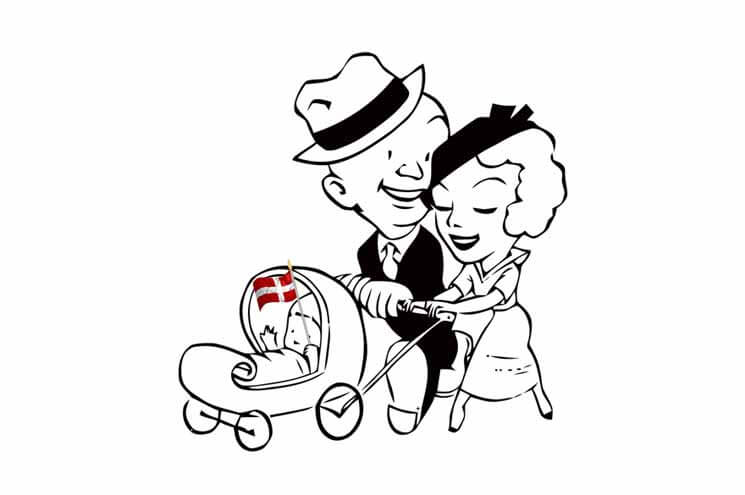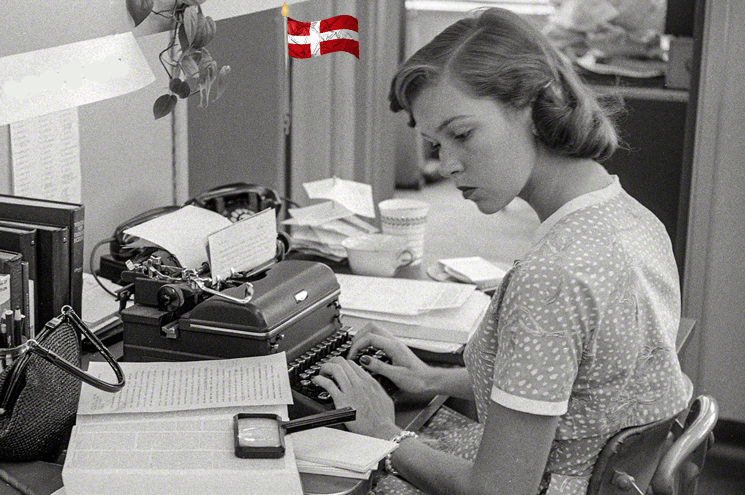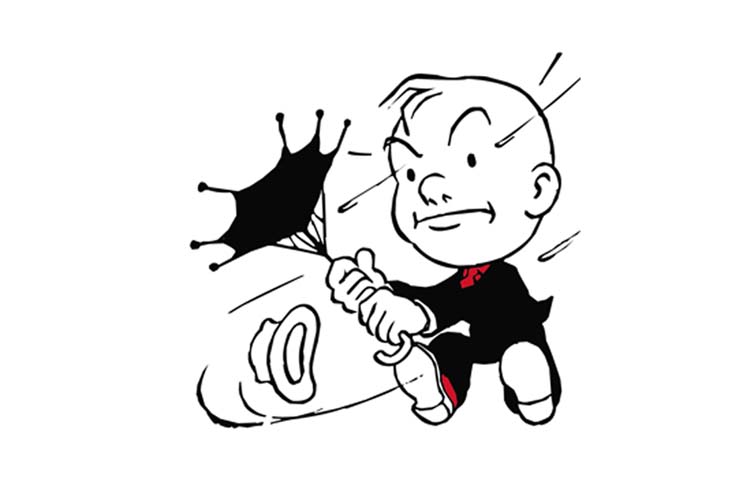On-the-job benefits in Denmark come in three categories: the kind every Danish worker gets, the kind everyone at your company gets, and the kind only top dogs at your company get.
When you talk with a future employer, there’s not all that much room for negotiation, unless you’re coming in at a very high level or have a highly sought-after specialty.
In most cases, as American kindergarteners say, “You get what you get and you don’t get upset.” Fortunately, job benefits in Denmark tend to be generous.
What everybody gets
Anyone with a full-time job in Denmark is entitled to five weeks’ annual vacation, three weeks of which must be during the summer period of May to September. This is in addition to the roughly 12 Danish public holidays per year.
During your first year on the job, some of this vacation time may be unpaid: you need to “save up” paid vacation time before you can take it. If you’re on salary, you employer will also put aside a percentage of your salary as a “vacation allowance” so you can enjoy your time off a bit more.
Health coverage in Denmark or EU only
Everyone is also covered by the Danish public health care system – although be aware that this insurance is only valid in Denmark if you are not a EU citizen. If you live in Denmark and travel to, say, the USA, you’ll need to seek out and pay for some extra insurance. (The rules are different for EU citizens, but they still need extra insurance when traveling outside of the EU.)
And every new parent in Denmark is entitled to parental leave. If you’re the one birthing the baby, you get to stop working 4 weeks before the birth (or, if your health requires it, even earlier) and then get 14 paid weeks off after the birth. After that, you and the baby’s other parent can divide 32 weeks of paid leave. Adoptive parents get similar benefits.
Topping up your parental leave money – but for how long?
Under law, parental leave is paid for by the government, which gives the parents dagpenge, the same amount of money that unemployed people receive. This is probably well under your weekly salary if you’ve come to Denmark as a professional.
Many companies top up this dagpenge so that you receive your full salary for the first six months of your parental leave – and sometimes for a full year. If this benefit is offered to anyone at the company, it’s generally offered to everyone.
The company food plan – lunch, breakfast, and sometimes dinner
Another benefit usually offered to everyone at the company is a lunch, usually a hot lunch.
This is a business strategy as much as a benefit: the company doesn’t want its people disappearing in the middle of the day to go find a sandwich or order the three-course prix fixe in a restaurant. They want them to refuel for 30 minutes and get back to their desks.
Small companies often pay for an external vendor to bring one or two dishes per day that everyone shares. Bigger companies have in-house chefs who produce a huge spread with salad options, home-baked bread and vegetarian options. These companies often provide breakfast in addition to lunch, and sometimes dinners for people who work the late shift. In some places, you can order (and pay for) a pre-packed dinner to take home and share with your family.
There’s usually a small monthly charge for the lunch plan, but this is for tax reasons: if you didn’t pay for it, it would be taxed as a benefit and end up costing you more.
It’s really not a good idea to refuse the lunch plan unless you have very specific dietary needs, because not being able to eat with your colleagues cuts you off from the all-important group spirit in Danish workplaces. If you have religious or medical reasons for avoiding certain foods, the meal providers will usually go out of their way to accommodate you.
The fruit plan: Your free daily banana
It’s also common for Danish workplaces to have a “fruit plan,” which provides big bowls of fresh fruit around the office. Each employee is entitled to one piece of fruit per day. Coffee and tea are usually free for employees, and there are sometimes healthy snacks like nuts available to all. Again, this is a business strategy as well as a benefit: employees who eat nutritious food are seen to be less likely to require expensive sick leave.
Surprisingly, health concerns seem to go out the window when customers come to call. Meetings with external customers are usually catered with sugary sodas, sugary pastries, and sometimes candy in bowls. Go easy on this stuff: I’ll never forget the non-Dane who pulled up a bowl of candy and ate the entire thing himself like a bowl of cereal.
These meeting treats can be worked off at the company gym, which large companies usually provide for all their employees. Smaller companies sometimes subsidize memberships at a local gym.
Pension – public and private
Everyone who works in Denmark must pay into the Danish government pension plan, and most employers have private plans in which you contribute around 5% of your base salary and the company contributes an extra 10% of your income. (You can take this money with you if you leave Denmark, although it will be heavily taxed at the time you withdraw it.)
The pension plan usually also includes some extra life insurance and long-term disability insurance. I always chose the plan with the maximum disability coverage available, because the Danish fortidspension payments for disability are difficult to get and not particularly generous.
Why do I need a private health care plan?
Many companies also offer all of their employees and their families private health care plans. You might ask: “Why do I need a private health care plan in a country like Denmark, where health care is tax-financed and free at the point of care?”
The answer is that public health care doesn’t cover everything: it provides life-saving treatment. Less urgent stuff like adult dentistry is excluded, for example, and so are eyeglasses. Non-traditional treatments like acupuncture and chiropractors are limited, and so is psychiatric or drug counseling if someone in your family should need it.
Your private health plan can cover this type of thing. It also provides quicker care for the kind of non-emergency operation that might require a wait at a public hospital – like a sports injury.
Benefits only the top dogs get
I’ve described the benefits that everyone in Denmark gets, and that everyone at a specific corporation gets.
Now a few words about the benefits you probably won’t get, unless you’re one of the very top dogs at a company or have a unique skill set.
For example, top executives usually get extensive bonus or stock option plans, but these are usually restricted to a certain pay grade. If you’re not in that pay grade, it’s not something you can negotiate for.
A company car may not be worth it
Company cars are also distributed by pay grade: top executives usually offered a leased luxury vehicle, although having a driver is considered rather pompous unless you are a CEO or prime minister. Salespeople may also get a company car if they’re expected to travel extensively by road, although they may also be asked to buy their own car and then be reimbursed for mileage.
The problem with getting a leased company car in Denmark is that this is a taxable benefit, and the cost of the taxes may rival the cost of actually owning your own car.
Some companies offer their employees a cash allowance to spend on a car instead, but cash allowances don’t accrue pension benefits like your regular salary does.
Bottom line: it might be a good financial move to get the cost of your “free” company car added to your salary, and then buy your own car. In that case, however, you’ll be responsible for maintenance and taxes. How much is the convenience of a leased car worth?
For that matter, if you live in Copenhagen or Aarhus, you may not need a car at all.
Biking is popular for all ages and economic classes in Denmark. In fact, you’ll often see the most aggressive and hungriest Danish executives turn up at the office in bike racing gear, take a quick shower, and then put on their business suits and conquer the world.
What you won’t get
A few employee benefits common in other countries are almost never seen in Denmark.
For example, housing allowances are very rare. You’ll be expected to pay for your housing on your own, although you may be given a small moving and relocation allowance.
Domestic help is almost never provided, although a few companies will let you pay to drop off your laundry and dry cleaning at the office and have an external company take care of it.
In general, domestic help and casual restaurant dining are rare in Denmark: if you plan to live here, even as a professional (and even as a man) you’ll need good cooking and cleaning skills.
Very wealthy families sometimes have an au pair girl to help with the kids, but generally, you’re on your own, with the possible exception of a bi-weekly cleaning person to do the heavy lifting.
Work from home
Working from home is a benefit you may be able to get, but will have to ask for. Many Danish companies will let you negotiate one or more days a week when you can skip traffic, skip meetings, and actually stay home and get stuff done.
They’ll also usually pay for a company mobile phone, but the usage is often monitored, so make sure to use this almost exclusively for work-related calls.
These benefits, like so many other Danish benefits, are taxable. Whenever you’re offered a benefit from your Danish employer, it’s a good idea to think in terms of – is this taxable, at Danish tax rates?
If it is, your benefit might just cost more than it’s worth.
Buy Kay’s books about Denmark on Amazon, Saxo, Google Books, Apple Books, Barnes & Noble Nook, or via our webshop.
Image mashup copyright Kay Xander Mellish 2025
Read more:
Decoding your Danish pay slip and understanding your Danish taxes
How to handle a Danish business meeting
What to wear to work in Denmark: Quiet colors, quality cut and fabric
Your first day at work in Denmark: Handshakes, passwords, and several people named Mette
Trailing spouses and working in Denmark
Motivating Danish employers: Tips for foreign managers
Networking in Denmark: 5 useful tips for making Danish business contacts
Secrets of socializing with your Danish colleagues
The Danish art of taking time off
Why job titles aren’t that important in Denmark
The Danish job interview
Job search in Denmark: Your Danish cover letter plus LinkedIn plus two magic words
Job hunting in Denmark: Putting together your Danish CV
Fine-tuning your approach to the Danish job market
Finding a job in Denmark: Some tips from my experience
Is joining a union a waste of money? And what is the difference between a union and an A-kasse?
Will I ever be promoted? Plus, how to leverage your annual review
Taking sick days in Denmark, plus how to deal with stress
Understanding your Danish boss: Less like a general, more like a sports coach





